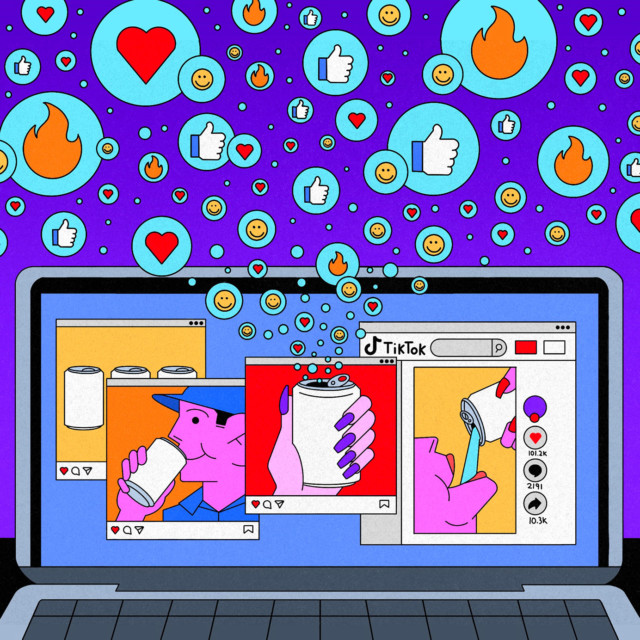There was a brief moment in time when I worked alongside Josh Ostrovsky, better known as The Fat Jewish. This was at Thrillist during digital media’s heyday (or what passed for a heyday, anyway), and we weren’t coworkers for long. After filming some viral videos for the publication, he moved on, launching his own wine brand with the two white guys behind White Girl Problems, a fictional social media persona that was wildly popular through the first half of last decade. (It was a simpler internet back then.) White Girl Rosé gave way to Babe, a full-fledged ready-to-drink brand built around unremarkable wine and #relatable slogans. Selling commodity canned wine, like selling commodities generally, is a marketer’s game, and whatever else Ostrovsky is, he’s an unbelievably good marketer. Babe sales boomed, and soon Anheuser-Busch InBev came calling. In 2018, the world’s biggest beer company acquired a stake in the brand; a year later, they swallowed it whole for an undisclosed sum.
We’ll come back to Babe in a minute. But first, a mea culpa. Last year, I reported a story for this publication about the then-novel rise of celebrity hard seltzers — that is, flavored malt beverages produced in partnership with and marketed by superstars of stage, screen, and Spotify playlist. The danger of writing trend stories is that not all trends come to pass, and when they do, they don’t always look like you predicted they would. Or, in this case, like I predicted they would. I heralded this new trend as “inevitable.” Inevitable! That’s pretty black-and-white. Too black-and-white, if you ask me. (Note to self: Allow for more wiggle room in the headline next time.) I wasn’t quite wrong, per se… but I wasn’t quite right, either.
If you’re reading this, you probably know how things played out in the segment over the rest of 2021. But if not, here’s a quick reminder. Hard seltzer’s two-year heater came to an end. It didn’t “fizzle” or “go flat,” as many mainstream outlets gleefully reported toward the back half of the year. The category still posted major growth in both volume and dollars (~20 percent and ~14 percent, respectively), and grew into a market worth nearly $5 billion. As Brandy Rand, COO of the Americas at IWSR Drinks Market Analysis, told my colleague Tim McKirdy in December 2021, “Despite all the sensationalist headlines about hard seltzer dying, the category is still healthy and growing.”
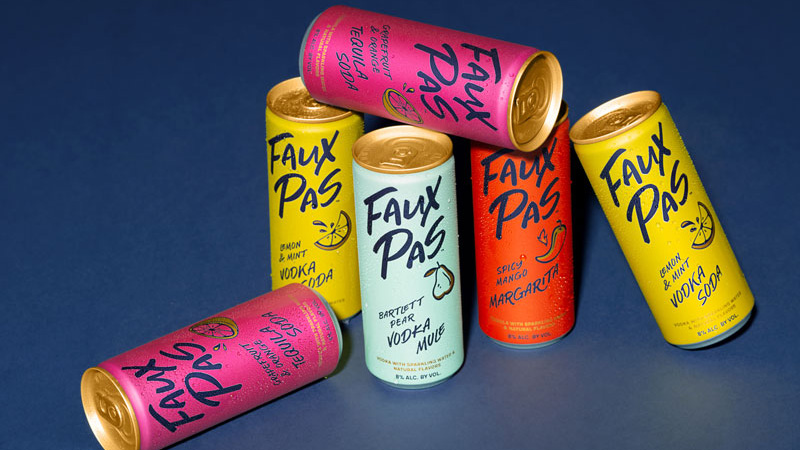
You know what’s not healthy and growing? CACTI. After a red-hot start, Anheuser-Busch InBev’s joint venture with A-list rapper and one-time brand whisperer Travis Scott got the summertime blues, struggling through the crucial vernal months with lagging restocks and inconsistent liquid. Things spiraled from there: In September, CACTI was hit with a class-action suit over its use of “agave” in its marketing; by December, it had been pulled from shelves entirely. The deadly crowd crush at Scott’s Astroworld festival in November, and the rapper’s subsequent retreat from the limelight (legally prudent though it may have been), sure didn’t help the brand.
None of that helped my crystal-ball gazing into CACTI’s future, either. A mere 15 months ago, I argued that the union of the world’s biggest beer company and one of its biggest musical acts looked more like bonanza than boondoggle. “Scott’s imminent entrance to the hard seltzer space is just the latest reminder that the white-hot category White Claw built is nothing like” beer, at least not in terms of celebrities using their famous faces to move cases. Along with category entrants from the likes of TV personality and chef Gordon Ramsay and country singer Luke Bryan, CACTI seemed like a harbinger of hard seltzer’s eminent endorse-ability among A-listers. “Big Bubbly is primed to leapfrog beer among big-name backers and follow in the spirits category’s grand tradition of celebrity-leveraged lucre in ways your IPA could never,” wrote your humble columnist. (Nobody tell Steve “Exception to the Rule” Austin.)
Smash cut to today, and… yeesh. If you bet big on Two Lanes or Hell’s Seltzer — not to mention CACTI — you’ve probably got your knickers in a twist right about now. And I’ve got egg on my face, because I expected more juice out of those brands’ celebrity backers. Mind you, I’m no “Hell’s Kitchen” superfan, and everything I know about Luke Bryan I’ve learned against my will. No, I expected these also-ran brands to perform well in the chock-a-block hard seltzer category because when the product is an easy-to-make commodity, and partners like ABI, City Brewery, and Constellation (those latter two handling Hell’s Seltzer and Two Lane, respectively) are plugging it into established distribution networks, marketing becomes the whole ballgame. As Doug Shabelman, CEO of Burns Entertainment, a marketing firm that specializes in celebrity licensing partnerships, told me last spring, hard seltzer is “literally just a commodity … so what talent is going to lend to it is that big story.”
It still makes sense! But it’s a tricky business, reading the tea leaves. My thesis may have been logical, but unsound. My premise was wrong; I got star-crossed. Or more accurately: I crossed stars. I still think celebrities are extremely well positioned to build strong brands in the hard seltzer segment (and, thanks to the ongoing blurring of lines between malt- and spirits-based beverages, the canned cocktail segment, too.) But having watched the beverage-alcohol landscape evolve this past year, it’s increasingly clear to me that the type of celebrity matters. Traditional stars — those whose fame derives from offline skills like acting or playing sports — remain powerful potential partners for full-proof liquor lines. (Not bourbon necessarily, but definitely tequila, for all these reasons and many more.) But when it comes to ready-to-drink single-serve stuff, the most exciting celebrity brands right now are being backed by digitally native creators with massively engaged online audiences. In other words, influencers, like, oh I don’t know, my one-time colleague The Fat Jewish.
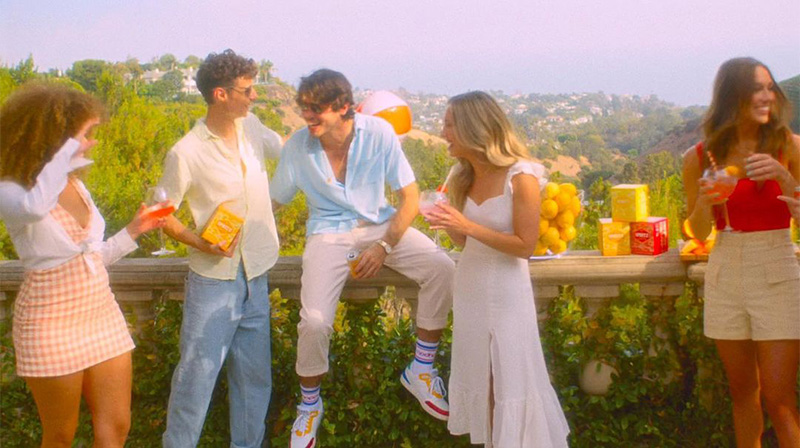
In other words, I should’ve seen this coming. Babe’s success portended a trend that’s only grown more pronounced with the mainstream adoption of mass-market FMBs. Here are just a few of the higher-profile influencer-backed brands that have hit the market in the past couple years alone:
- Happy Dad, a hard seltzer line launched by the Nelk Boys, a super-popular YouTube collective
- Spritz Society, an RTD cocktail line launched by Ben Soffer, who runs the Instagram page @BoyWithNoJob
- Faux Pas, an RTD cocktail line launched by the @Betches media empire
- High Noon, an RTD cocktail line, which benefits from a “unique media partnership” with Barstool Sports personalities including high-profile executives Dave Portnoy and Erica Nardini
- Alani Seltz, a hard seltzer line by fitness creator Katy Hearn
And on, and on. There are others, of course, plus plenty of margin calls. For example: Is Bravo-lebrity Kyle Cooke, the founder of Loverboy hard tea, more of an influencer or a reality TV star? Should a bottle of Spade & Sparrows (the wine brand launched by former “Bachelorette” contestant Kaitlyn Bristowe) be considered a single serving? And what about Onda, actress-preneur Shay Mitchell’s canned tequila-soda brand?
Questions for another column, perhaps. But for the remainder of this column, I’d like to zero in on Happy Dad, because I think it’s one of the best examples of how superstar creators can succeed with RTDs where traditional celebrities — even those with massive social media presences like Travis Scott et al. — may stumble.
Though the brand didn’t respond to my interview request, we can learn plenty about Happy Dad from sales data and the Nelk Boys’ enormous backlog of social content about it. The hard seltzer, which is contract-brewed at Wisconsin’s venerable Minhas Craft Brewery, is selling like hot cakes. Scan data from both Nielsen and IRI put it in the top 15 brands in the entire category. As Good Beer Hunting editor Bryan Roth pointed out in a tweet last month, Happy Dad “has made the same amount of sales in IRI-tracked chain retail as entire portfolios for brewers like Boulevard and Ninkasi.” Run that back: A hard seltzer brand introduced to American drinkers just a year ago by a collective of vlogger jocks with no prior booze business experience is selling better than craft breweries that have been plying their trade for 33 and 16 years, respectively.
That’s impressive growth, all the more so given that Happy Dad is currently only distributed in 10 states. Then again, this isn’t the Nelk Boys’ first foray into business, just the drinks business. Last summer, Taylor Lorenz reported for The New York Times that the group — comprised of a half-dozen familiar faces and ring-led by frontman Kyle Forgeard — was on track to sell $70 million worth of merchandise. It’s a lot of money, but with nearly 15 million YouTube subscribers across a half-dozen channels, plus another 5 million-plus Instagram followers, they’ve got the reach.
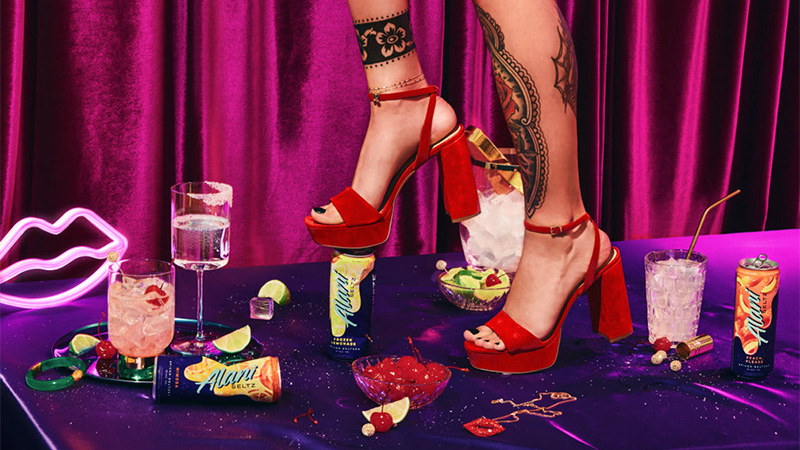
But with 45 million Instagram followers and a failed seltzer brand to show for it, Travis Scott found out the hard way that mere reach isn’t everything. Celebrity backers’ commitment to the product is key to success. That means posting, and posting a lot, something run-and-gun creators are capable of and comfortable with in ways that more polished stars are not. While reporting on CACTI last year, I asked Jeffrey Kobulnick, an intellectual property attorney and partner at Brutzkus Gubner Rozansky Seror Weber, how that worked contractually. “I have actually worked on deals … where the celebrity has to post a certain number of times a month” to fulfill their partnership agreement, he told me. Good thing it wasn’t the Hell’s Seltzer contract, or Gordon Ramsay would probably be in breach: The mega-chef doesn’t appear to have mentioned his own FMB brand to his 13 million Instagram followers since October of last year. The volume of posting is almost meaningless if the content isn’t quality. Compare this boring Two Lane video from Luke Bryan to this photo set of Spritz Society’s Soffer frollicking in a spritz-ified swimming pool full of citrus wheels. One of these people is very evidently more committed to their booze brand than the other. Audiences — er, customers — can tell the difference.
“The value of a celebrity, or even influencer-owned brands, really comes from the involvement of that person in the brand itself, and in the promotion,” Evy Lyons, the chief marketing officer of account-based marketing at Traackr, an influencer relationship management firm, tells me. “The reason we follow influencers is because they’re adding some sort of value to our lives. If they want to launch a product to us, then they have to weave that into the narrative that’s already captured us.” In this regard, the Nelk Boys are master weavers, incorporating their hard seltzers in videos on both their main channel and its own dedicated channel, as well as frequent appearances on the Full Send podcast stream. It’s not just low-stakes or juvenile product placement, either — though there’s plenty of that, plus some really crude advertising. But the brand gets top billing throughout the troupe’s highest-profile and most substantive videos, too.
Interview with former President Donald Trump? Happy Dad. Golf outing with Caitlyn Jenner? Happy Dad. Ringside at U.F.C. fights? Happy Dad. Their fans get all the same style and subject matter of content they’ve come to expect from the Nelk Boys; the Nelk Boys get seamless owned-and-operated advertorials to promote their FMB brand. Tally up all that free product placement, and Happy Dad’s super-premium price point, and you start to understand why Forgeard told Lorenz last year that “YouTube money is pennies compared to building businesses like a seltzer.” Don’t forget all the branded merch — the same wide-brimmed sun hat that a big FMB brand might give away as swag, Happy Dad is able to sell out of at $60 a pop.
Of course, in the United States at least, selling sun hats is a lot easier than selling seltzer, on account of the federal law dictating legal drinking age. “A lot of the larger brands we work with don’t want to work with influencers whose audience is not primarily of age,” says Lyons. “That’s something that they look at very closely, so when they’re vetting influencers for potential partnerships, one of the big things they look for is the percentage of that person’s audience that’s over 21.” Being in the booze business means playing by the rules, which is kind of anathema to the Nelk Boys’ whole schtick. Influencers “have to be really careful if their audience is a younger generation and that’s who they originally were marketing to,” cautions Lyons. “They have to be aware of and respect the law just like any other brand in the space.” Getting your Trump interview banned from YouTube for violating misinformation guidelines is one thing; getting nailed on regulatory violations by the Alcohol and Tobacco Tax and Trade Bureau or the Federal Trade Commission is quite another.
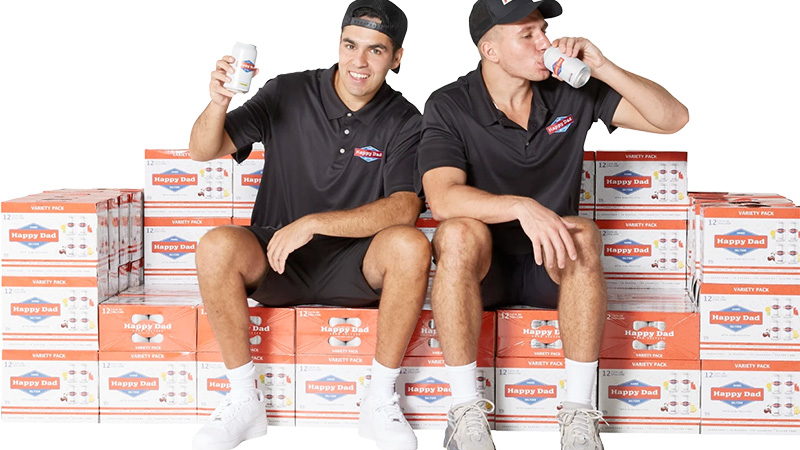
Last summer, Forgeard told The Times he believed Happy Dad could be a billion-dollar brand. It seemed naive to me at the time, what with all the complexities of the American booze business, and the actual celebrities charging into the wide-open segment. But what a difference a year makes. The fact that FMBs and canned cocktails are whetting American thirst for mass-market liquids with accessible flavors and branding has indeed left the door wide open for celebrity partnerships in the RTD space, like I thought it would. I just didn’t think influencers like the Nelk Boys would have more success walking through that door than traditional celebrities. But I should have. Just as the nature of RTDs is changing, so too is the nature of celebrity. It was a full three years ago that The Fat Jewish parlayed purloined memes into a canned wine fortune, after all, and the beverage-alcohol business has only gotten blurrier since. So will Happy Dad be the mega-brand that CACTI never was? Billion with a “b” still seems like a stretch to me, but this time, I’m going to leave myself a little wiggle room.
This story is a part of VP Pro, our free platform and newsletter for drinks industry professionals, covering wine, beer, liquor, and beyond. Sign up for VP Pro now!
